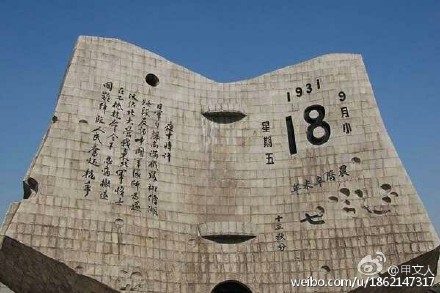
The September 18th Historical Museum, founded in 1991, is located at No. 46 Wanghua Nanjie, Dadong District, Shenyang, at the site where the September 18th Incident broke out in 1931. Photo: Weibo
Starting with the spring semester of 2017, China’s textbooks will expand the span of the Second Sino-Japanese War from 1937-1945 to 1931-1945, in which around 35 million Chinese soldiers and civilians were killed, according to an announcement by the Ministry of Education on Tuesday.
China's textbooks will adopt the phrase "Fourteen-year Chinese People's War of Resistance Against Japanese Aggression" from March this year, while the current textbooks use the phrase "Eight-year Chinese People's War of Resistance Against Japanese Aggression."
According to the announcement issued by the ministry, textbooks should fully reflect the crimes committed by Japanese troops in the war.
Peng Xunhou, a researcher at the Academy of Military Sciences of PLA China, told Sino-US.com that the argument on whether it should be “eight-year war of resistance ” or “fourteen-year war of resistance” has been going on for some time among Chinese scholars because while Japan’s aggression on China started from northeast China in 1931, a nationwide resistance war against Japan’s aggression started after a crucial access point to Beijing, Lugou Bridge, also known as Marco Polo Bridge, was attacked by Japanese troops on July 7, 1937. The nationwide anti-Japanese war is usually called as “full-scale” anti-Japanese war in Chinese.
According to the Ministry of Education, the revision is a bid to implement guidelines of central authorities on commemorating the 70th anniversary of victory in the anti-Japanese war and the World Anti-Fascist War, and to “strengthen patriotic education.”
“To revise the ‘Eight-year Chinese People's War of Resistance Against Japanese Aggression’ into ‘Fourteen-year Chinese People's War of Resistance Against Japanese Aggression’ conforms to the truth of Chinese history. The eight-year war refers to the nationwide battle against Japanese troops, while the previous six years were regional, mainly in China’s northeast parts,” Peng said, “but when it comes to Chinese people’s war of resistance against Japanese invasion, it should include both the six years and eight years.”
A member of staff was quoted Tuesday by The Beijing News as saying that the decision to change the definition of the war was made in October 2016 by leaders within the State Council, China’s cabinet.
China was the first nation to fight against fascist forces. While the struggle started as early as September 18, 1931, when Japanese troops began their invasion of northeast China, it was intensified after Japan's full-scale invasion, Peng said.
On September 18, 1931, Japanese troops blew up a section of the railway under their control near Shenyang, then accused Chinese troops of sabotage as a pretext for attack. They bombarded barracks near Shenyang the same evening, starting the 14-year bloody invasion. This was known as the September 18 Incident.
According to Peng, the expression of “Fourteen-year Chinese People's War of Resistance Against Japanese Aggression” is also the consensus among Chinese mainland top leaders, and the revision of the textbooks is mainly aimed at “establishing a proper historic view” for students, as the revision applies to universities and schools, all relevant disciplines, and textbooks for national and local curriculums.
The news on Tuesday soon spread on Sina Weibo, a Twitter-like Chinese microblog, and quickly captured the attention of the users who mostly used the original textbooks when they were at school.
“The change of wording to 14-year in the textbooks should have been done earlier,” said @袁氏吉强.
“The war of resistance should include Chinese people from the whole nation. It’s not just about any one party or class,” remarked @小虫奇遇记.
“We should respect history, while never forgetting the humiliation by other countries,” said @芒果味的小仙女不会飞.
Some also think “It would be better if Japan could admit what they had done during the war”.
While many users are showing their support to the revision, some also think that such a revision shows that the history is “too easy to be rewritten.”
“Well this is history. People can change it anytime,” said @台灣-檳榔妹.
“The history is always like a little girl who can be dressed up,” @苍天不可语 said.
| Touched | Sympathetic | Bored | Angry | Amused | Sad | Happy | No comment |